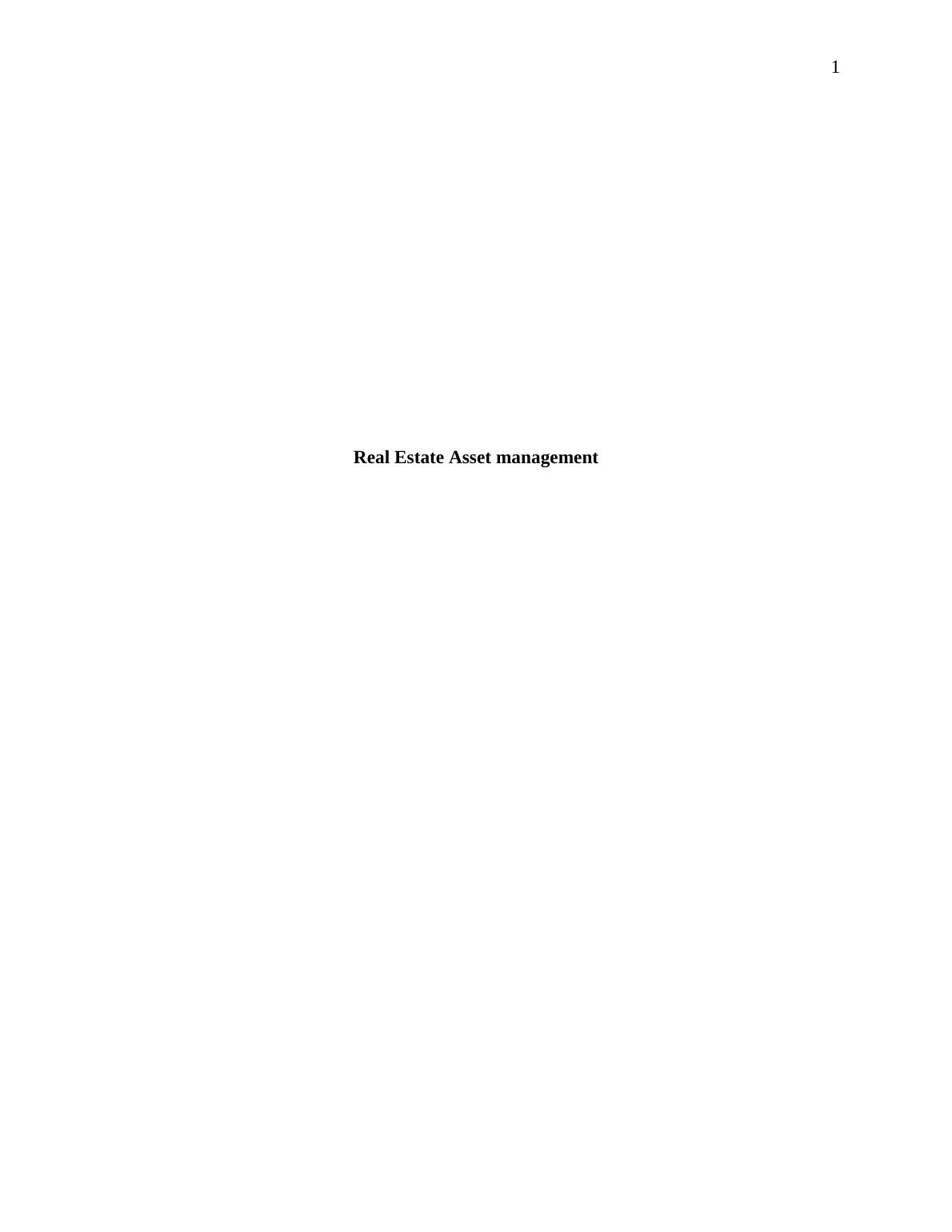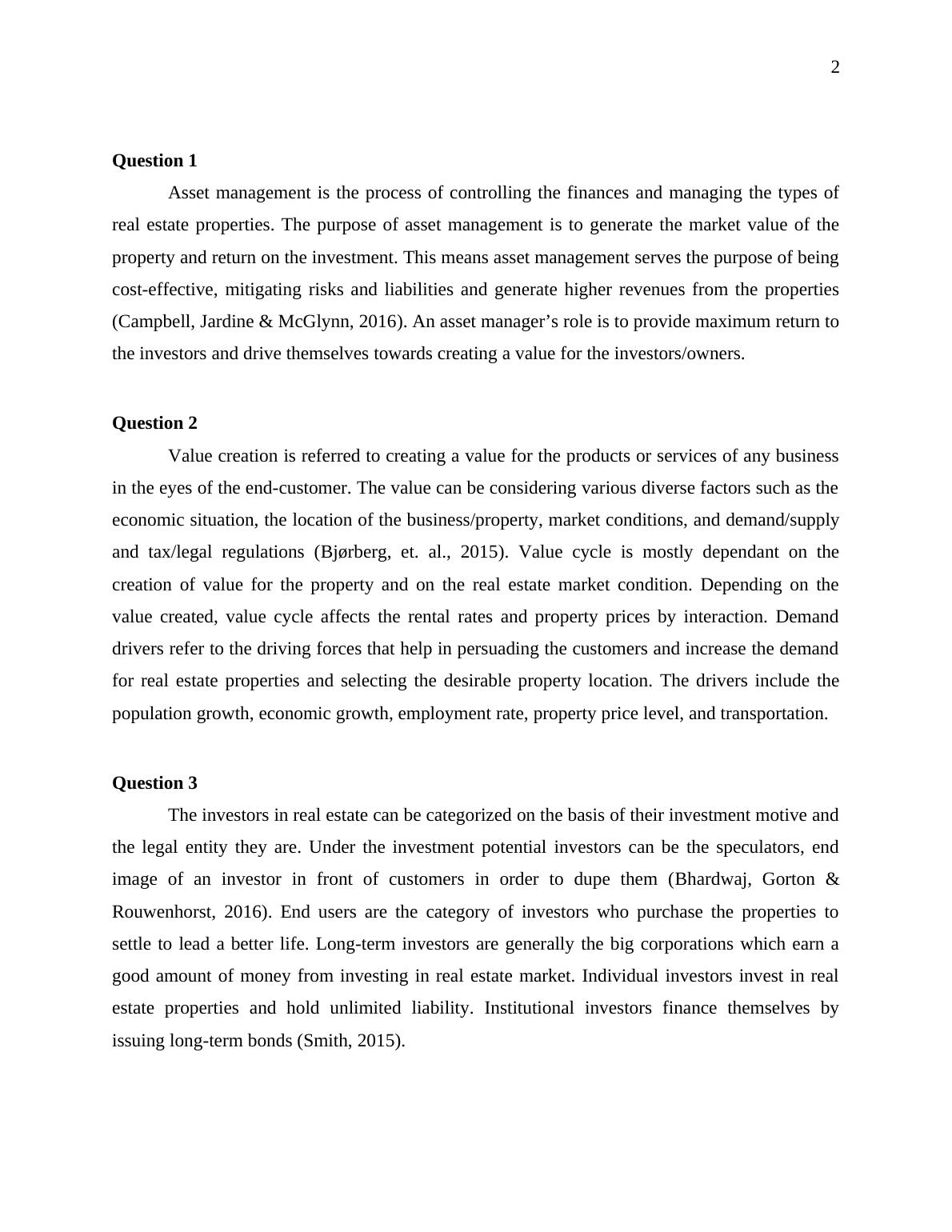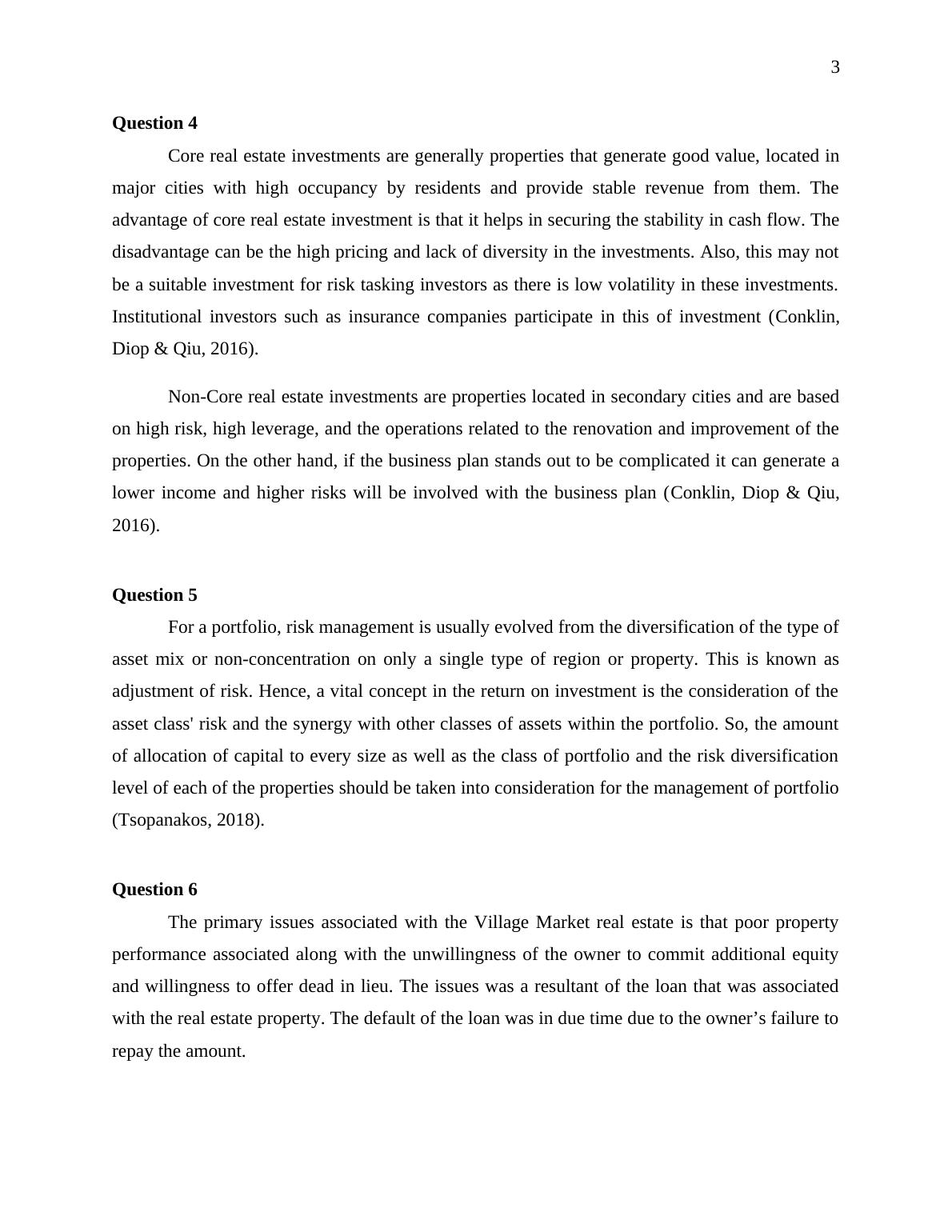Real Estate Asset Management
Added on 2023-06-03
6 Pages1651 Words178 Views
1
Real Estate Asset management
Real Estate Asset management

2
Question 1
Asset management is the process of controlling the finances and managing the types of
real estate properties. The purpose of asset management is to generate the market value of the
property and return on the investment. This means asset management serves the purpose of being
cost-effective, mitigating risks and liabilities and generate higher revenues from the properties
(Campbell, Jardine & McGlynn, 2016). An asset manager’s role is to provide maximum return to
the investors and drive themselves towards creating a value for the investors/owners.
Question 2
Value creation is referred to creating a value for the products or services of any business
in the eyes of the end-customer. The value can be considering various diverse factors such as the
economic situation, the location of the business/property, market conditions, and demand/supply
and tax/legal regulations (Bjørberg, et. al., 2015). Value cycle is mostly dependant on the
creation of value for the property and on the real estate market condition. Depending on the
value created, value cycle affects the rental rates and property prices by interaction. Demand
drivers refer to the driving forces that help in persuading the customers and increase the demand
for real estate properties and selecting the desirable property location. The drivers include the
population growth, economic growth, employment rate, property price level, and transportation.
Question 3
The investors in real estate can be categorized on the basis of their investment motive and
the legal entity they are. Under the investment potential investors can be the speculators, end
image of an investor in front of customers in order to dupe them (Bhardwaj, Gorton &
Rouwenhorst, 2016). End users are the category of investors who purchase the properties to
settle to lead a better life. Long-term investors are generally the big corporations which earn a
good amount of money from investing in real estate market. Individual investors invest in real
estate properties and hold unlimited liability. Institutional investors finance themselves by
issuing long-term bonds (Smith, 2015).
Question 1
Asset management is the process of controlling the finances and managing the types of
real estate properties. The purpose of asset management is to generate the market value of the
property and return on the investment. This means asset management serves the purpose of being
cost-effective, mitigating risks and liabilities and generate higher revenues from the properties
(Campbell, Jardine & McGlynn, 2016). An asset manager’s role is to provide maximum return to
the investors and drive themselves towards creating a value for the investors/owners.
Question 2
Value creation is referred to creating a value for the products or services of any business
in the eyes of the end-customer. The value can be considering various diverse factors such as the
economic situation, the location of the business/property, market conditions, and demand/supply
and tax/legal regulations (Bjørberg, et. al., 2015). Value cycle is mostly dependant on the
creation of value for the property and on the real estate market condition. Depending on the
value created, value cycle affects the rental rates and property prices by interaction. Demand
drivers refer to the driving forces that help in persuading the customers and increase the demand
for real estate properties and selecting the desirable property location. The drivers include the
population growth, economic growth, employment rate, property price level, and transportation.
Question 3
The investors in real estate can be categorized on the basis of their investment motive and
the legal entity they are. Under the investment potential investors can be the speculators, end
image of an investor in front of customers in order to dupe them (Bhardwaj, Gorton &
Rouwenhorst, 2016). End users are the category of investors who purchase the properties to
settle to lead a better life. Long-term investors are generally the big corporations which earn a
good amount of money from investing in real estate market. Individual investors invest in real
estate properties and hold unlimited liability. Institutional investors finance themselves by
issuing long-term bonds (Smith, 2015).

3
Question 4
Core real estate investments are generally properties that generate good value, located in
major cities with high occupancy by residents and provide stable revenue from them. The
advantage of core real estate investment is that it helps in securing the stability in cash flow. The
disadvantage can be the high pricing and lack of diversity in the investments. Also, this may not
be a suitable investment for risk tasking investors as there is low volatility in these investments.
Institutional investors such as insurance companies participate in this of investment (Conklin,
Diop & Qiu, 2016).
Non-Core real estate investments are properties located in secondary cities and are based
on high risk, high leverage, and the operations related to the renovation and improvement of the
properties. On the other hand, if the business plan stands out to be complicated it can generate a
lower income and higher risks will be involved with the business plan (Conklin, Diop & Qiu,
2016).
Question 5
For a portfolio, risk management is usually evolved from the diversification of the type of
asset mix or non-concentration on only a single type of region or property. This is known as
adjustment of risk. Hence, a vital concept in the return on investment is the consideration of the
asset class' risk and the synergy with other classes of assets within the portfolio. So, the amount
of allocation of capital to every size as well as the class of portfolio and the risk diversification
level of each of the properties should be taken into consideration for the management of portfolio
(Tsopanakos, 2018).
Question 6
The primary issues associated with the Village Market real estate is that poor property
performance associated along with the unwillingness of the owner to commit additional equity
and willingness to offer dead in lieu. The issues was a resultant of the loan that was associated
with the real estate property. The default of the loan was in due time due to the owner’s failure to
repay the amount.
Question 4
Core real estate investments are generally properties that generate good value, located in
major cities with high occupancy by residents and provide stable revenue from them. The
advantage of core real estate investment is that it helps in securing the stability in cash flow. The
disadvantage can be the high pricing and lack of diversity in the investments. Also, this may not
be a suitable investment for risk tasking investors as there is low volatility in these investments.
Institutional investors such as insurance companies participate in this of investment (Conklin,
Diop & Qiu, 2016).
Non-Core real estate investments are properties located in secondary cities and are based
on high risk, high leverage, and the operations related to the renovation and improvement of the
properties. On the other hand, if the business plan stands out to be complicated it can generate a
lower income and higher risks will be involved with the business plan (Conklin, Diop & Qiu,
2016).
Question 5
For a portfolio, risk management is usually evolved from the diversification of the type of
asset mix or non-concentration on only a single type of region or property. This is known as
adjustment of risk. Hence, a vital concept in the return on investment is the consideration of the
asset class' risk and the synergy with other classes of assets within the portfolio. So, the amount
of allocation of capital to every size as well as the class of portfolio and the risk diversification
level of each of the properties should be taken into consideration for the management of portfolio
(Tsopanakos, 2018).
Question 6
The primary issues associated with the Village Market real estate is that poor property
performance associated along with the unwillingness of the owner to commit additional equity
and willingness to offer dead in lieu. The issues was a resultant of the loan that was associated
with the real estate property. The default of the loan was in due time due to the owner’s failure to
repay the amount.

End of preview
Want to access all the pages? Upload your documents or become a member.
Related Documents
Investment Recommendation for Mr. Jack - Fundamentals of Investinglg...
|7
|1504
|451
Brookfield Asset Management Report 2022lg...
|204
|122032
|25
Investment Analysis and Portfolio Managementlg...
|10
|2256
|66
Management of Property Asset - Study Material and Analysislg...
|11
|1958
|198
An Insight of Land Speculationlg...
|9
|1861
|195
Investment Analysislg...
|7
|1434
|162
